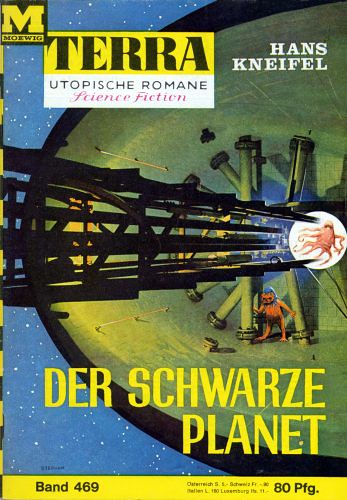Hans Kneifel : Der schwarze Planet
Terra SF 469, 15.07.1966
Originalausgabe
Titelbild : Karl Stephan
Ein terranisches Raumschiff findet eine Station von Außerirdischen. Die Besatzung, ein Mann und seine halbandroidische Freundin, finden einen im Sterben liegenden Alien, der ihnen noch die Bedienung des interstellaren Transmitters - das ist die Raumstation nämlich - erklären kann. Sie halten die Raumstation in Betrieb und retten so das Transmitternetz der Außerirdischen.
Originally serialized in Galaxy as "Here Gather the Stars," this novel won a Hugo in 1964. Set in rural Wisconsin, near Simak's home town of Millville, it recounts the strange story of Wallace, a veteran of the Civil War who is still alive, and seemingly never-aging, more than a hundred years later. No date is mentioned, but one can assume the novel is set in present day, the early 1960s at the time of its writing, but Wallace still lives in the house his father built, and it is much as it was when he returned from four long years of war (at least in outwardly appearance). Shortly thereafter, he was approached by a stranger, one who turned out to be an alien who had an unusual offer to extend. Enoch becomes the caretaker of a Galactic way station, wherein aliens travel from planet to planet in the areas of space they have colonized, not in ships but by means of matter transmission. All of the equipment necessary has been installed in his house, including the construction of vast basement space for storage of artifacts given to Enoch by the travellers. The alien's superior technology has made the exterior of the house invulnerable. No one without authorization can enter, plus while Enoch is inside he does not age. Since he only goes out for a daily walk to the mailbox, he only ages about an hour per day on average.aus den Kommentaren von Galen Strickland zu "Way Station" von Clifford D. Simak
Of course, being set on Earth and among humanity, you know that idyllic condition won't last forever. Rumors surrounding Enoch find their way to the ears of a vacationing government agent, one who takes it upon himself to set up around the clock surveillance of the Wallace homestead. That and certain actions by neighbors of Wallace lead to confrontations that threaten to expose his operation, plus Galactic Central is having internal difficulties of its own which could mean the abandonment of the Earth way station. There is only one plot twist that was telegraphed too early, but for the most part things happen in a random and unpredictable way. It is definitely the best book of Simak's that I have read, but if it has any fault it is perhaps a too optimistic view of how humanity would react to the knowledge of the cosmic reality. I can forgive him for that, since it is the way I would want it to be too.
Man sieht deutlich die Ähnlichkeiten beider Romane, wobei es allerdings bei diesen oberflächlichen Ähnlichkeiten bleibt, die Ausführungen beider Autoren sind doch sehr unterschiedlich. Bemerkenswert finde ich den optimistischen Blickwinkel beider Autoren, kein Vergleich mit den doch eher düsteren Darstellungen heutiger Schriftsteller.
In den 60ern waren die Verbindungen der deutschen SF zur amerikanischen noch deutlich stärker als heute, von daher ist mir nicht ganz klar, inwieweit Kneifel sich mit Simak ausgetauscht hat. In jedem Fall liest sich "Der schwarze Planet" ganz nett, etwas sehr voraussehbar zwar, aber trotzdem kurzweilig. Hans Kneifel zeigt hier schon die typischen Versatzstücke des lässigen Helden, die seine Romane der 70er unverkennbar machen werden. Es lohnt sich also, diesen Roman zu lesen.

Keine Kommentare:
Kommentar veröffentlichen